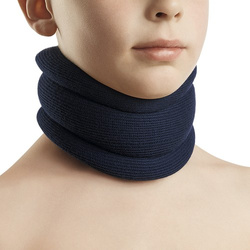Orthopedic cervical collars for neck stability
( number of products: 23 )Orthopedic cervical collars come in a number of variants, each is made to treat specific conditions. These range from the soft collar to the semi-stiffened and most stiffened option. However, before choosing the right neck collar for yourself, it is essential that you first consult with your doctor or physiotherapist.
Cervical collars - who are they for?
Depending on the model, a cervical collar is primarily worn in order to protect the cervical spine against further neck injuries and dislocations which may cause severe nerve or spinal cord damage. More stiffened models are often used for treating neck pain after accidents, spinal injuries, cervical degenerative disc disease, as well help speed up the post-surgery recovery process.
The soft cervical collar model is used for treating torticollis and more minor injuries of the cervical vertebrae. Semi-stiffened cervical collars are most often recommended in order to treat degenerative diseases, hernias, and may be used during the later stages of rehabilitation and recovery after surgery.
How do cervical collars function and what are their benefits?
A well-chosen orthopedic collar ensures neck stabilization, no matter which model you look at. Depending on its purpose, a neck collar can come in varying degrees of stiffness and neck immobilization - either complete immobilization or partial, and therefore, it is important that the collar is selected in accordance with the recommendations of a certified medical specialist.
The most stiff orthopedic collars are designed to allow as little neck movement as possible, thus providing added protection to not only the length of the cervical spine, but the sides as well. The cervical collar stiffens the spine, from top on the chin, the lower jaw and occipital part of the skull, down to the shoulders, back and chest, thus providing extra protection to the spinal cord from every position.
Due to the added stabilization, the cervical spine is less prone to injuries and neck pain, and allows for faster recovery. When worn after surgery, the collar immobilizes the cervical spine and prevents swelling, tissue damage, and improves proper regeneration. What's more, a high-quality and well-chosen orthopedic collar will effectively removes neck pain and shoulder tension.
Some cervical collars are not just for neck protection, but may serve other purposes, like treating patients who have had a tracheostomy. This type of collar variant is worn by patients who have suffered severe injuries after an accident or surgery. This type of collar is applied strictly by doctors and medical staff.
How to choose the right cervical collar for yourself?
When it comes to choosing the right collar for yourself, it all depends on your injury. Will a soft cervical collar help treat your condition? Or perhaps a more stiffened option? The decision should be made by your doctor or physiotherapist and must be based on the progress of rehabilitation. Once you know which variant you should choose, make sure to take your time when selecting the right collar, as you need to select one that will comfortably fit your neck.
Medical staff may also help you in selecting the right-size collar for yourself as well. Bear in mind that cervical collars come in both adult and children's sizes and selecting one with the right circumference isn’t all you need to look for - it needs to be the right height as well.
Collars such as the Philadelphia and the soft orthopedic collar are certified medical equipment made of skin-safe materials and are designed to properly fit the anatomical structures of the cervical spine Thanks to this, they do not cause neck pain or any discomfort. A well-chosen collar size prevents chafing, guarantees comfort during recovery and ensures a quick and safe regeneration process.

Cervi-Hit Sporlastic anatomical cervical support with reinforcement for day and night
- 1
- 2



















